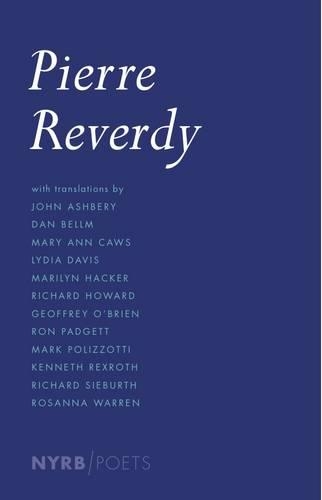
Pierre Reverdy
(Paperback, Main)
Publishing Details
Pierre Reverdy
By (Author) Pierre Reverdy
New York Review Books
NYRB Poets
15th September 2013
31st October 2013
Main
United States
Classifications
General
Non Fiction
841.912
Physical Properties
Paperback
184
Width 11mm, Height 178mm, Spine 114mm
153g
Description
Pierre Reverdy, who was close to Picasso and Braque and was enormously admired by the surrealists, is one the greatest of modern French poets and one of the most elusive. His work is at once impersonal and intimate, crystalline and opaque, simplicity itself and mysterious as can be. Paul Auster has described his poems as combining an "intense inwardness with a proliferation of sensual data...The poet seems to evaporate, to vanish into the haunted country he has created...as if Reverdy had emptied the space of the poem in order to let the reader inhabit it." And John Ashbery has shown himself to be no less devoted than his friend O'Hara to Reverdy, whose poems he has translated throughout his career. The strength of this new selection of Reverdy's poetry, which includes both translations that have been specially commissioned for this volume along with a range of outstanding earlier ones, is not only to provide a sampling of Reverdy's finest work in all its variety but also to document the appeal it has had for so many of America's best writers and translators. Reverdy is represented by work early and late, from the pioneering Prose Poems of 1915 and Roof Slates of 1918 to his violently conceived and brutally worded, war-haunted poems of 1946 to 1948, entitled The Song of the Dead (originally illustrated by Picasso) to his final Freedom of the Seas of 1960. The twelve distinguished translators involved are John Ashbery, Dan Bellm, Mary Ann Caws, Lydia Davis, Marilyn Hacker, Richard Howard, Geoffrey O'Brien, Ron Padgett, Mark Polizzotti, Kenneth Rexroth, Richard Sieburth, and Rosanna Warren.
Reviews
"a superb bilingual introduction to a not-so-well known but very approachable poet" Times Literary Supplement The great Pierre Reverdy, comrade to Picasso and Braque, peer and contemporary of Wallace Stevens and William Carlos Williams, is among the most mysteriously satisfying of twentieth-century poets, his poems an uncanny mixture of the simple and the sublime. The Poetry Foundation Pierre Reverdy is among the greatest of modern French poets, and certainly among the most elusive. His work is at once impersonal and intimate, crystalline and opaque, simple to the point of austerity. The landscape of his poetry is both instantly recognizable and, devoid of local specificity, imbued with an otherworldly strangeness. He is 'a secret poet for secret readers,' as Octavio Paz once described him, insisting on the necessity of parsing the silence, the empty spaces between what seems visible in the lines of his poems. Each feels like a fragment of a universe, and yet whole. Mary Ann Caws on Pierre Reverdy for Poetry Society of America A poem by Reverdy is a spiritual fact: everything that makes up the human being--sensations, feelings, other men and women--has been passed through the filter of poetry. Octavio Paz Reverdy, with Paul Eluard...is the purest of the writers of his time. Philippe Soupault
Author Bio
PIERRE REVERDY (1889-1960) was a French poet who, along with artists and writers such as Guillaume Apollinaire, Max Jacob, Pablo Picasso, Juan Gris, and Georges Braque, helped develop cubism and surrealism. Soon after the appearance of his first significant collection, Les Epaves du ciel (1924), his writing turned more mystical and Reverdy became a Catholic. In 1926 he retired to a life of ascetic seclusion near the Benedictine monastery at Solesmes and stayed there for the rest of his life. MARY ANN CAWS is Distinguished Professor of Comparative Literature, English, and French at the Graduate School of the City University of New York and a Fellow of the American Academy of Arts and Sciences. She is the author of dozens of books, including Glorious Eccentrics: Modernist Women Painting and Writing, Surrealism, and Surprised in Translation, and is the translator of, among many others, Andre Breton, Rene Char, Stephane Mallarme, Raymond Roussel, Jacques Roubaud, and Gherasim Luca.
